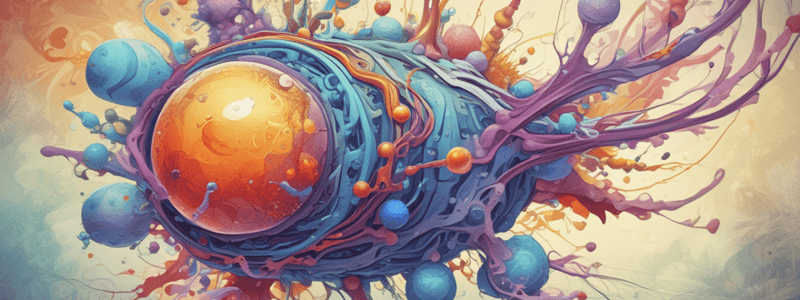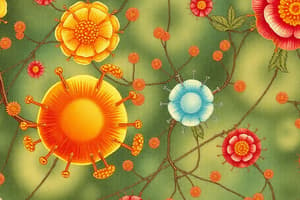Podcast
Questions and Answers
What is the characteristic of antigens that are freely circulating in the body?
What is the characteristic of antigens that are freely circulating in the body?
- Being molecules, viruses, or foreign cells (correct)
- Displaying aberrant MHC proteins
- Being engulfed and broken down
- Being synthesized by virus-infected and tumor cells
What is the main function of plasma cells in the humoral response?
What is the main function of plasma cells in the humoral response?
- Recognizing antigens through binding
- Providing future immunity
- Costimulating B cells
- Producing antibodies with identical antigen specificity (correct)
What is the primary target of the cell-mediated response?
What is the primary target of the cell-mediated response?
- Cells that display aberrant MHC markers (correct)
- T cells that recognize self cells
- Antigens circulating in the lymph or blood
- B cells that recognize antigens
What is the role of interleukins in the immune response?
What is the role of interleukins in the immune response?
What is the result of B cells recognizing antigens through binding?
What is the result of B cells recognizing antigens through binding?
Flashcards are hidden until you start studying
Study Notes
• The immune system distinguishes between two groups of foreign substances: antigens that are freely circulating in the body and self cells that display aberrant MHC proteins. • Antigens that are freely circulating in the body include molecules, viruses, and foreign cells. • Aberrant MHC proteins can originate from exogenous antigens that have been engulfed and broken down or from endogenous antigens synthesized by virus-infected and tumor cells. • The humoral response, also known as the antibody-mediated response, involves B cells that recognize antigens or pathogens circulating in the lymph or blood. • B cells recognize antigens through binding, and interleukins or helper T cells costimulate B cells, leading to B cell proliferation and production of plasma cells. • Plasma cells produce antibodies with identical antigen specificity as the antigen receptors of the activated B cells, which are then released and circulate through the body, binding to antigens. • B cells also produce memory cells, providing future immunity. • The cell-mediated response involves mostly T cells and responds to cells that display aberrant MHC markers, including cells invaded by pathogens, tumor cells, or transplanted cells. • T cells recognize self cells or antigen-presenting cells (APCs) displaying foreign antigens through binding, and interleukins costimulate activation of T cells. • If MHC-I and endogenous antigens are displayed on the plasma membrane, T cells proliferate, producing cytotoxic T cells that destroy cells displaying the antigens. • If MHC-II and exogenous antigens are displayed on the plasma membrane, T cells proliferate, producing helper T cells that release interleukins and stimulate B cells to produce antibodies and nonspecific agents (NK and macrophages) to destroy the antigens.
Studying That Suits You
Use AI to generate personalized quizzes and flashcards to suit your learning preferences.




